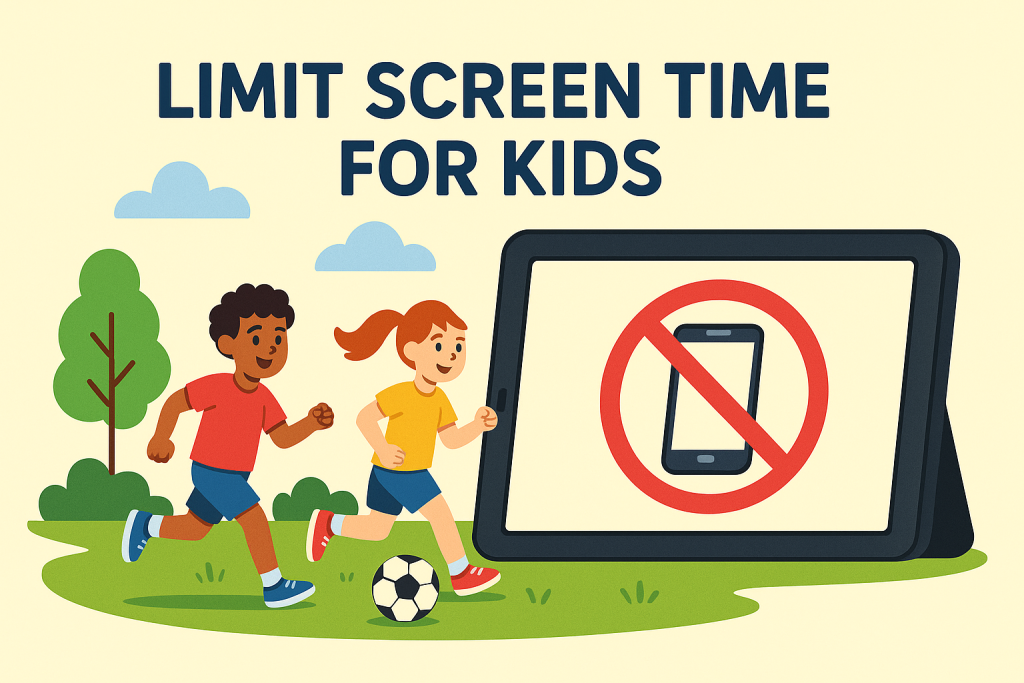Screens are everywhere – TVs, tablets, smartphones, computers. For many families, limiting screen time feels like a constant battle. But there’s strong evidence that too much screen time can harm kids’ health, development, and wellbeing.
In this article, we’ll explain why it’s important to limit screen time for kids, share evidence about its negative effects, and give you practical, parent-tested tips to help you set healthy limits in your home.
Why Limiting Screen Time Is Important
Excessive screen time doesn’t just replace physical activity—it also affects sleep, mental health, and social development. Here’s why setting limits matters:
1. Supports Healthy Development
The NHS recommends limiting screen time for young children because it can interfere with language development and social skills. Screens can replace time spent playing, reading, and interacting with others—activities crucial for cognitive growth.
2. Reduces Risk of Obesity
Kids who spend hours in front of screens tend to be less physically active. Studies link high screen time with higher BMI and increased obesity risk. One review found that reducing screen time helped lower BMI in children over time.
3. Improves Sleep Quality
Blue light from screens can delay melatonin production and disrupt sleep. Children who use screens before bed often fall asleep later, have poorer sleep quality, and may be more tired during the day.
4. Protects Mental Health
Excessive screen time has been linked to higher rates of anxiety and depression, particularly among teens. Social media use can also fuel comparison, cyberbullying, and low self-esteem.
Evidence of the Negative Impact of Too Much Screen Time
Here’s what the research says:
- A 2019 study published in JAMA Pediatrics found children aged 2–5 who had more than 1 hour of screen time daily had lower scores on developmental screening tests.
- A meta-analysis in Obesity Reviews (2019) concluded reducing screen time is an effective strategy to prevent childhood obesity.
- The Royal College of Paediatrics and Child Health (RCPCH) suggests no screen time at all for babies under 18 months (other than video chatting) and cautious, shared use for older children.
- The Sleep Foundation warns screen use before bed can reduce sleep duration by up to 30 minutes per night in children.
These studies underline the real risks of unregulated screen use—and the benefits of healthy limits.
Practical Tips for Limiting Screen Time
✅ 1. Set Clear Rules
Agree on daily limits. The American Academy of Pediatrics suggests no more than 1 hour of screen time for 2–5-year-olds, and consistent limits for older kids.
Example rule: No screens at dinner or during homework time.
✅ 2. Create Screen-Free Zones
Make bedrooms, dining rooms, and cars (for short trips) screen-free. This reduces passive use and promotes conversation.
✅ 3. Be a Role Model
Kids copy what they see. Put your own phone away during family time. Show that adults also have screen limits.
✅ 4. Prioritise Active Play
Encourage outdoor activities, sports, and unstructured play. The UK Chief Medical Officers recommend at least 60 minutes of physical activity daily for 5–18-year-olds.
✅ 5. Use Parental Controls
Set device time limits and approve apps/games. Many devices have built-in controls to help you monitor and manage usage.
✅ 6. Talk About It
Explain why limits matter. Kids are more likely to cooperate when they understand screens can affect sleep, health, and mood.
✅ 7. Plan Tech-Free Family Activities
Board games, reading together, walks, or outings can replace screen-heavy downtime with quality connection.
Final Thoughts
Limiting screen time isn’t about banning technology—it’s about balance. By setting clear, consistent limits, you help your child develop healthy habits that support their body, mind, and relationships.
Making small, sustainable changes now can have a big impact on your child’s lifelong wellbeing.
📌 References & Further Reading
- NHS – Physical activity guidelines for children
- Royal College of Paediatrics and Child Health (RCPCH) Screen Time Guidance
- Obesity Reviews (2019) – Meta-analysis on screen time and obesity
- JAMA Pediatrics (2019) – Screen time and early childhood development
- The Sleep Foundation – Screen use and sleep in children
Published on kidsfitnessgear.co.uk, supporting UK parents with evidence-based advice on kids’ fitness and health.

